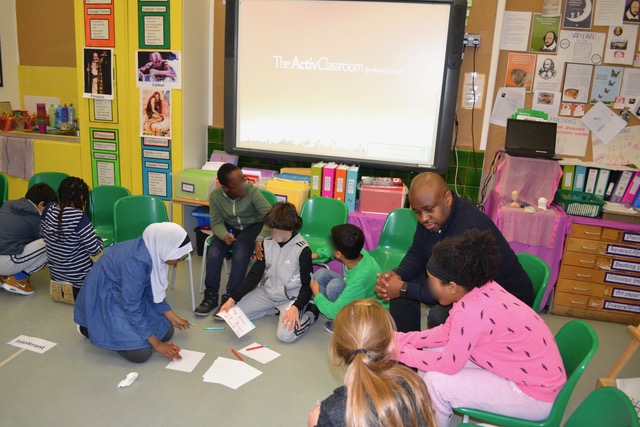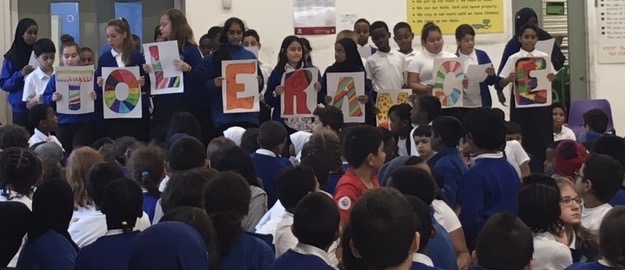You can download a copy of the full survey report here.
Given the resurgence of intolerant language and attitudes engendered by the Brexit and US election campaigns, at Learn2Think we wanted to understand how children of a young age experienced the world and expressions of intolerance.
The survey was undertaken to anonymously explore primary school aged children’s experience of such behaviour, and any thoughts they might have on how to make the world a more tolerant place.
An interesting analysis post-election in the US was the different voting patterns by age, and the fact that Trump would not have been elected by millennial voters. This underscores the fact that as generational shifts occur, we see changes in how society accepts increased diversity and creativity.
We developed the ToDay programme to mark the UN International Day for Tolerance as it appears increasingly important that we make acceptance, understanding and dialogue central to the way we educate our children.
These are their thoughts:
Have people been mean to you because you’re different?
For over 40 per cent of respondents, someone has mean to them because they were different.
It is sad to recognise that a number of children are already experiencing the impact of being seen as different, even at primary school, and the ways in which their peers can react to that difference.
Twenty three per cent of children have experienced meanness because they behave or act differently to their peers, and 19 per cent because they look different, while 14 per cent have suffered because their opinions or beliefs differ.
Why do you think people are mean to those who are different?
The children who responded to the survey clearly recognise that one of the reasons that children are mean to them is because of factors that have nothing to do with them. Eighty-eight per cent of respondents felt that people were mean because they want to feel better than other people, or that they were simply mean.
Yet 36 per cent of the children were aware that people can be mean about others because they’ve heard or been told bad things about them, seeing this as a driving force behind people being mean.
The importance of getting to know people also came through the responses as an important element in making a difference to behaviour, with 25 per cent of the children thinking the problem is caused by people not knowing them properly and a further 20 per cent thinking it’s because they’ve never seen this sort of difference and are afraid of it.
There were a few instances where a child said outright that the behaviour they experienced was because of their skin colour, or their attacker was racist, or didn’t like their religion. Given the natural open-mindedness of most children, it is the insidious nature of intolerance, the idea that that which is different is wrong, which is of such concern at such a young age.
Comments from the children suggested we include the notion that their attackers could be jealous, they could have horrible things happening at home, or that they’d been bullied themselves, or even that they were worried that they were going to be bullied so it was safer to join in on an attack.
What do you think could make the world a more tolerant place?
Perhaps most impressive was the result that 53 per cent of children said that the most important way of making the world a more tolerant place would be if people were kinder to each other.
While only 14 per cent of children said the most important thing was to make the world more tolerant was for adults to listen to children more, there were a significant number of children who thought that this was the second or third most important thing, at 43 per cent.
A significant number of the children also felt that finding new and different things exciting and not scary was the second and third most important element to a more tolerant world, at 34 per cent.
How could we make people less afraid of those who are different?
One of the most important findings from the survey were the ways in which we could make people less scared of each other and they were: learning more about people who are different; thinking about the things we have in common; and talking more to people who are different. These came in at 40 per cent, 32 per cent and 28 per cent respectively.
It’s worth noting however that many of the children made comments about how important it was to make friends with people who are different, to experience their lifestyles and to play together. One child suggested having a talk with class mates about why we are different. It’s clear that children recognise that understanding each other is crucial to getting along, probably a suggestion that adults could learn from. And remember, as one child pointed out, “It does not matter if you’re different, you’re perfect the way you are in different ways.”
Questions for the Prime Minister
Many of the same questions arose and unsurprisingly many of those questions focused on issues around fairness and the need to prevent bullying. There was a definite interest in the need for more kindness and a surprising number of children were politicised, with varying calls for the right of children to vote, either generally or at least on matters that would impact them.
We have identified the questions which arose and listed them below but the questions most often raised – up to 10-15 times - were about children’s right to vote on things that affect them, and the problems and challenges of inequality (whether of access to money, home, healthcare or food).
Children just seem to want the world to be a fairer place.


 RSS Feed
RSS Feed